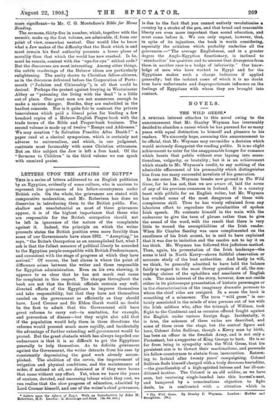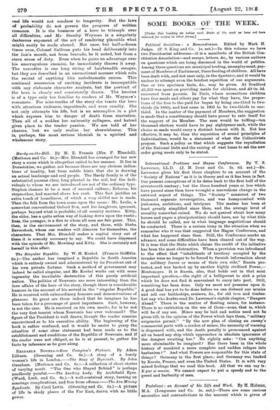NOVELS.
THE WILD GEESE.*
A SPECIAL interest attaches to this novel owing to the announcement that Mr. Stanley Weyman has irrevocably decided to abandon a career which he has pursued for so many years with equal distinction to himself and pleasure to his readers. We sincerely hope, assuming this announcement to be official, that Mr. Weyman may reconsider a decision which would seriously disappoint the reading public. It is no slight achievement to cater for the unappeasable hunger for romance which besets that public without ever lapsing into sensa- tionalism, vulgarity, or brutality ; but it is an achievement which stands to Mr. Weyman's credit, to say nothing of the admirable effacement of his personality which distinguishes him from too many successful novelists of his generation.
In one sense Mr. Weyman breaks new ground in The Wild Geese, for he has not, that we are aware of, laid the scene of any of his previous romances in Ireland. It is a country beset with pitfalls for an English writer, but Mr. Weyman has evaded some of the most dangerous of these with conspicuous skill. Thus he has wisely refrained from any laborious effort to reproduce the peculiarities of spoken Irish speech. He contents himself in the main with the endeavour to give the turn of phrase rather than to give the sound of the word, with the result that there is very little to wound the susceptibilities of the Irish reader. When Sir Charles Santley was once complimented on the excellence of his Irish accent, he is said to have explained that it was due to imitation and the resolve not to lay it on too thick. Mr. Weyman has followed this judicious method. Then, again, his presentation of the Irish landscape—the scene is laid in North Kerry—shows faithful observation or accurate study of the best authorities. And lastly he will, we think, be generally admitted to have held the balance fairly in regard to the most thorny question of all, the con- tending claims of the upholders and assailants of English rule. The main interest of the story, however, does not reside either in its picturesque presentation of historic personages or in the characterisation of the imaginary dramatis personae to whom the chief roles are assigned. In a sense the book is something of a misnomer. The term " wild geese " is cer- tainly associated in the minds of nine persons out of ten with the Irish soldiers who, after the triumph of William, took flight to the Continent and as occasion offered fought against the English under various foreign flags. Incidentally, it is true, the schemes of these exiles. are described, and some of them cross the stage, but the central figure and hero, Colonel John Sullivan, though a Kerry man by birth, has been an officer in the Swedish Army, and is not only a Protestant, but a supporter of King George to boot. He is so far from being in sympathy with the Wild Geese, that his persistent aim is to thwart their machinations, and persuade his fellow-countrymen to abstain from insurrection. Return- ing to Ireland after twenty years' campaigning, Colonel Sullivan finds himself charged with a truly damnosa haereditas, —the guardianship of a high-spirited heiress and her ill-con- ditioned brother. The Colonel is an old soldier, as we have seen, but venturing single-handed into this hornet's-nest, and hampered by a conscientious objection to fight duels, he is confronted with a situation which in • The Wild Gees.. By Stanley F. Weyman. London: Hodder and Stoughton. [6..] real life would not conduce to longevity. But the laws of probability do not govern the progress of written romance. It is the business of a hero to triumph over all difficulties, and Mr. Stanley Weyman is a singularly dexterous exponent of the art of rendering plausible what might easily be made absurd. Not once, bet half-a-dozen times over, Colonel Sullivan puts his head deliberately into the lion's month, not from bravado, be it noted, but from a stern sense of duty. Even when he gains an advantage over hie unscrupulous enemies, be immediately throws it away. The narrative is one long string of hairbreadth escapes, but they are described in an unemotional manner which robs the recital of anything like melodramatic excess. This continual succession of exciting incidents is incompatible with any elaborate character analysis, but the portrait of the hero is clearly and consistently drawn. The heroine is of a type only too familiar to readers of Mr. Weyman's romances. For nine-tenths of the story she treats the hero with atrocious rudeness, ingratitude, and even cruelty. She not only attempts his life, but is an accomplice in a plot which exposes him to danger of death from starvation. Then all of a sudden her animosity collapses, and hatred gives place to the tender passion. We are told of her charms, but we only realise her shrewishness. This is, perhaps, the most serious blemish in a spirited and wholesome story.



































 Previous page
Previous page